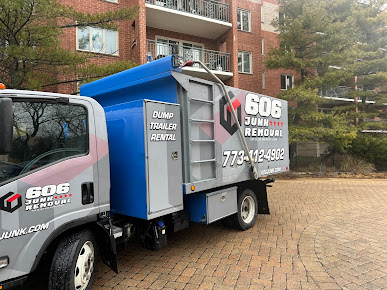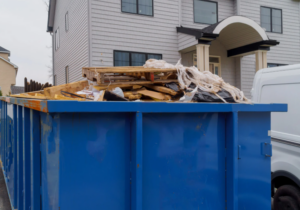
Some people think they’ll save a few bucks by renting a smaller dumpster—until they’re staring at a mountain of junk spilling over the sides halfway through the job. It’s like trying to squeeze a sectional couch into a broom closet. No matter how clever your pivot, it’s just not happening. Choosing the wrong size doesn’t just cramp your cleanup—it drags out your timeline and can result in surprise expenses for extra hauls or a second dumpster. And let’s be real, no one wants that kind of disruption.
While your gut might whisper, “smaller is safer,” that logic often leads to bigger headaches. Going larger from the start is the smarter play, especially with renovations or bulky furniture. When debris piles up faster than expected, having that extra space saves you stress, time, and sanity.
Overlooking Permit Requirements for Street Placement
Dumpsters parked in private driveways typically go unnoticed, but once you drop one on a public street—especially in cities like Chicago—you’re in a whole new world of rules and regulations. Skipping the permitting process isn’t just a minor oversight; it can result in hefty fines that easily surpass the cost of the rental itself. Municipalities enforce these rules to maintain traffic flow, pedestrian access, and city order. It’s not about red tape—it’s about keeping neighborhoods safe and organized.
Getting a permit isn’t complicated, but it does require some planning. Reach out to your local Department of Streets and Sanitation, or Public Works office, before the container arrives. In some cities, even a short-term drop-off requires documentation, especially if street parking is limited or meter bags are needed. That one phone call can save you from tickets, towing fees, or even a forced removal. Don’t assume “it’ll be fine.” Plan ahead and protect yourself from preventable penalties.
Filling the Dumpster With Prohibited Items
Just because something fits in a dumpster doesn’t mean it belongs there. Many people treat dumpsters like a catch-all for junk, tossing in anything from old paint cans to batteries, tires, or even fluorescent bulbs—items that are actually banned in standard landfill disposal. These materials are considered hazardous waste and require special treatment. Violating these rules can not only rack up extra fees but may cause the entire load to be rejected at the disposal site.
If that happens, guess who’s footing the bill? You are. Dumpster rental companies must follow local, state, and federal waste regulations, and they’ll pass the consequences on to the renter if something goes wrong. Before loading, review the rental agreement and ask for a list of restricted items. If you’re ever unsure about something—especially chemicals or electronics—err on the side of caution. When in doubt, leave it out. Responsible dumping protects the environment, saves you money, and keeps the whole process hassle-free.

Waiting Too Long to Schedule Your Dumpster
Dumpster rentals aren’t like ride-shares waiting around the corner—they’re part of a scheduled service with real logistical challenges. Waiting until the day before your cleanup to book a container might leave you with slim pickings or none at all. In cities like Chicago, where demand spikes during peak seasons, available units disappear fast. And even if you do get lucky, the dumpster might not be the size you need, or it might arrive days later than you’d hoped. The result? A stalled project and a growing pile of junk that delays everything else.
Smart planning means calling ahead and locking in your date as early as possible—especially if your project overlaps with busy seasons like spring cleanups, home remodels, or moving weekends. Don’t assume dumpsters are sitting idly by waiting for your call. Get on the schedule, confirm your rental terms, and secure the right size before you start swinging hammers. The earlier you plan, the smoother your project will go.
Placing the Dumpster in the Wrong Spot
Where your dumpster goes is just as important as when it arrives. Placing it without consideration can cause damage, delays, or even safety issues. Put it on soft ground, and you might come back to find ruts in the lawn or a sunken container that can’t be retrieved without a tow truck. Park it in front of a garage, and suddenly you can’t access tools or get your car out. A bad placement blocks foot traffic, irritates neighbors, and can even violate local codes or HOA rules.
Instead, choose a level, paved surface like a driveway that offers enough clearance for the delivery truck and allows for easy access during your project. Be mindful of overhead wires, tight turns, or narrow alleys. Think not just about where the dumpster lands, but how it’ll get removed. Once it’s dropped, it won’t move without effort and cost. So be strategic.
Underestimating the Rental Time You’ll Need
You thought it was a two-day job—until the skies opened up, the contractor canceled, or the project expanded unexpectedly. Suddenly, that “quick” cleanup turns into a week-long battle with debris. If you only booked the dumpster for a short rental window, you might face overage fees or, worse, a missed pickup that leaves the container sitting in your driveway like a steel tombstone. Padding your rental time by a day or two is an easy way to sidestep those complications.
Dumpster companies often charge less for extra time up front than they do for last-minute extensions. It’s not about being pessimistic—it’s about building a safety net for when things go sideways. Life happens. Construction delays, weather surprises, and sheer exhaustion can all throw off your timeline. Don’t gamble with the clock. Give yourself room to breathe.
Ignoring Weight Limits and Overfilling the Load
When you rent a dumpster, you’re not just renting space—you’re renting weight capacity, too. Most rental agreements clearly define how many tons you’re allowed to dump. Go over that limit, and the fees can stack up fast. For example, if you fill a container with concrete, bricks, or roofing materials, you might hit the weight cap before you’re even halfway full. Worse yet, if your load is too heavy or improperly distributed, the hauler might refuse pickup due to safety or legal restrictions.
That means rescheduling, repacking, or even manually removing materials—none of which are fun. Overfilling vertically is also a mistake; if items are sticking up over the top, they could fall out during transport, posing serious hazards and triggering violations. To avoid these problems, balance your load, check your materials’ weight, and never stack above the rim.
Forgetting to Plan for Dumpster Pickup Timing
You finished your project, breathed a sigh of relief—and then the dumpster sat there. For days. Maybe even weeks. Why? Because you forgot to schedule the pickup, or assumed the company would magically retrieve it when you were done. Unfortunately, it doesn’t work that way. Most dumpster rental companies require advance notice for retrieval, and depending on demand, they might not be able to send a truck out right away.
That means your driveway or curb space stays blocked, your neighbors start complaining, and you rack up extra daily charges. In some cases, you could even face city or HOA fines for prolonged placement. To avoid this slow-burning inconvenience, schedule your pickup when you schedule your drop-off—or call the company a day before your project ends. Planning the end is just as important as planning the start.
Neglecting to Communicate Special Instructions
Not all properties are created equal. Maybe your driveway has a steep incline. Maybe there are low-hanging power lines, overgrown trees, or tight alleys that make maneuvering a full-sized dumpster truck a logistical puzzle. These little details can create major problems if they’re not communicated during booking. At best, your dumpster gets dropped in the wrong place. At worst, the truck can’t complete delivery, delaying your entire project and possibly charging you for a failed trip.
Dumpster companies aren’t mind readers—they rely on accurate information to make each delivery go smoothly. Before your scheduled drop-off, take a walk around your property. Identify obstacles, tricky access points, or any unique quirks the driver should know about. Then pick up the phone or include notes in your booking. A five-minute conversation can prevent a full day’s delay.
Believing the Cheapest Option is Always the Best
We all love a deal, but when it comes to dumpster rentals, going for the cheapest option can cost you far more in the long run. A low base rate might look great online—but what’s hidden in the fine print? Some budget companies tack on surprise fees for delivery, weight overages, permit assistance, or even fuel surcharges. Others offer vague timeframes, meaning your dumpster could arrive late, or not at all. And good luck getting help when you call—budget services often cut corners on customer support, too.
Instead of chasing the lowest price, focus on total value. Ask about everything that’s included: weight limits, rental duration, pickup guarantees, and support availability. Look for reviews, check policies, and read the rental agreement. Paying a little more for a reputable, responsive company can mean faster service, fewer headaches, and no nasty surprises on your bill.
Conclusion
Renting a dumpster in a busy city like Chicago comes with its own set of challenges—tight alleys, permit requirements, and strict scheduling can all throw a wrench in your project if you’re not prepared. That’s why it’s essential to avoid common pitfalls like choosing the wrong size, ignoring local regulations, or working with unreliable providers. A little foresight goes a long way. Taking the time to plan ahead, check zoning requirements, and understand what can and can’t go into the dumpster can save you from costly surprises and project delays.
For a smooth, stress-free rental experience, turn to 606 Junk Removal and Dumpster Rental, based right here in Chicago, IL. Whether you’re tackling a home renovation or clearing out an estate, call 773-412-4902 or email info@606junk.com for expert guidance and dependable service.
